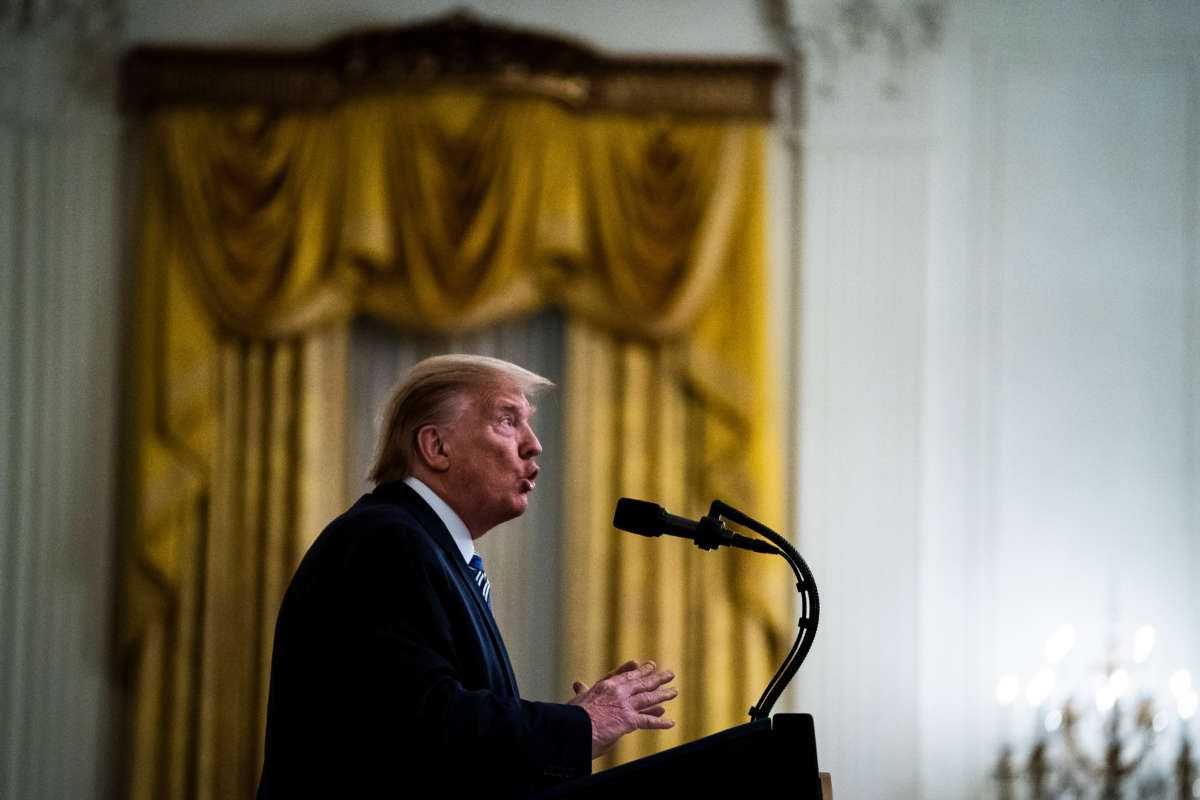President Donald Trump is threatening that his administration “will strongly regulate, or close” social media sites that attach disclaimers to inaccurate or misleading content, following an incident in which Twitter fact-checked his tweet about mail-in voting.
On Tuesday, a tweet from Trump that included an unsubstantiated claim about voter fraud and mail-in voting was examined by Twitter and later featured a disclaimer from the site at the bottom of it.
“There is NO WAY (ZERO!) that Mail-In Ballots will be anything less than substantially fraudulent,” Trump wrote, adding that “Mail boxes will be robbed, ballots will be forged & even illegally printed out & fraudulently signed.”
Voting by mail has been expanded in 2020 due to fears about spreading coronavirus at in-person voting locations later this year.
Mail-in voting and absentee ballots have been a part of the American political process for more than a century — Trump himself has utilized voting by mail as he’s a resident of Florida but lives and works in Washington, D.C. There is no evidence to back the president’s claims that voting by mail would lead to rampant fraud.
Twitter inserted a caveat below the tweet from Trump in the form of a hyperlink next to an exclamation mark, which read, “Get the facts about mail-in ballots.” Those who clicked on the link were directed to a page produced by Twitter that was titled, “Trump makes unsubstantiated claim that mail-in ballots will lead to voter fraud.”
The president’s claims “are unsubstantiated, according to CNN, Washington Post and others. Experts say mail-in ballots are very rarely linked to voter fraud,” the social media site wrote, adding a slew of tweets to back up its point.
In response, Trump later on Tuesday launched a missive against the company. “Twitter is completely stifling FREE SPEECH, and I, as President, will not allow it to happen!” he said.
On Wednesday he went further, threatening that his administration “will strongly regulate, or close” social media sites that regulate content in such a way.
However, Trump’s threats may be limited by constitutional and statutory law. Free speech isn’t “stifled” by companies like Twitter — the right to free speech is protected by the First Amendment of the Constitution, which prevents the government from regulating or curtailing speech it disagrees with, except in rare circumstances where community safety may warrant it. The amendment does not apply to a private platform like Twitter, which can set its own rules about what’s acceptable content and who can or cannot participate.
Twitter’s actions are also protected by the Communications Decency Act, which gives social media sites significant leeway in deciding how to regulate their content.
If anything, Trump’s actions threatening to regulate a platform like Twitter itself may be a threat to free speech — telling a private entity that its actions around regulating content on its platform are themselves going to be regulated, simply because the president didn’t like what it chose to do over his tweets that were full of false information.
Twitter’s actions this week were a rare rebuttal of Trump’s frequently errant tweets. The company has resisted calls in the past to hold the president to the same community standards that other users are subjected to. While users on the platform can be suspended or even removed from the site permanently for excessive bullying or spreading of false information, Trump has been given free rein to continue on without impediments of any kind, or threats of action against him by the company if he doesn’t stop behaving outside of their rules.
Last October, in an effort to address concerns by users about the president’s actions online, Twitter put forward a policy about content from “world leaders” that the company hoped would explain why it didn’t take actions against political heads of state.
“Our mission is to provide a forum that enables people to be informed and to engage their leaders directly,” Twitter said on its page explaining the policy, adding that only the promotion of terrorism, threats of violence, the posting of private information, harm to children, or encouragement of self-harm to others, would be regulated.
“In other cases involving a world leader, we will err on the side of leaving the content up if there is a clear public interest in doing so,” the site said at the time.
Join us in defending the truth before it’s too late
The future of independent journalism is uncertain, and the consequences of losing it are too grave to ignore. To ensure Truthout remains safe, strong, and free, we need to raise $24,000 by the end of today. Every dollar raised goes directly toward the costs of producing news you can trust.
Please give what you can — because by supporting us with a tax-deductible donation, you’re not just preserving a source of news, you’re helping to safeguard what’s left of our democracy.
